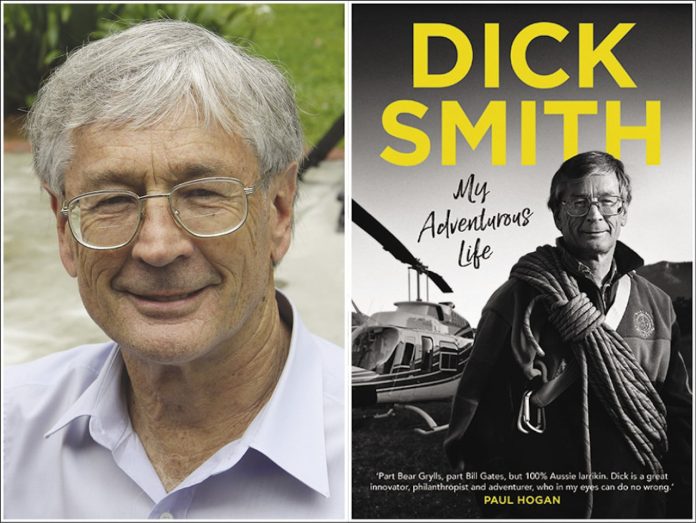Dick Smith is cruising through his seventies.
Famous for flying planes and helicopters, setting records, embarking on outrageous adventures and supporting causes, Dick’s still doing much the same. When he can.
Busy donating millions of dollars to causes every year, the energetic father-of-two and grandfather of five, found writing his autobiography among his most demanding tasks.
“It’s taken me 20 years,” Dick told me from his Sydney office.
“I started it 20 years ago. Then, when we had the (pandemic) lockup, my wife (Pip) said ‘you’ve got to finish the book’, so I worked on it for four months.
“I’m a radio installer. Luckily, I had two writers to assist from time to time and then the publisher’s editing turned it into a good book, thankfully.”
Dick, with Pip, loves flying his helicopter into Western Australia. They do it most years.
“Flying the helicopter around WA is fantastic. The Pilbara, Kimberley, beautiful country. We also fly to our farm near Canberra when we can,” he said.
Their latest trip, however, was by 4WD, up Gibb River Road to Halls Creek and on to Darwin where their car and campervan are locked-up due to pandemic border restrictions.
“The campervan has a queen-size bed but I like to get into my swag by the fire. We meet plenty of people who seem surprised to see me way out there and I don’t mind saying hello, no problems at all.”
The Smiths have lived for 40 years in Sydney where, Dick says, property prices have become ridiculous.
“All generations should be better off than previous generations. Today, young people are lucky if they can afford a home unit, squashed-in like termites in a high rise.
“It means we’ve gone backwards if people can’t afford a house with a front yard and a back yard like we could.
“I always say I’ve won the luckiest lottery in life being born in the 1940s.
“We just missed Vietnam, we never had to go to war and had a wonderful time of growth. There’s no doubt I benefitted from it. But you can’t have growth forever, you need to have life in balance.”
Dick says he supports Australia maintaining average immigration of about 70,000 a year.
“But when it gets to 200,000 people-a-year, that’s going to take our population to 100 million by end of this century when our grandchildren will still be alive.
“Not many people think 100 million people is essential for an arid country like Australia.
“We have to stop growing one day, to improve efficiencies and reduce waste, just not have more and more people, or we are doomed.”
Dick’s book (My Adventurous Life. $39.99 Allen & Unwin) describes his many breathtaking, risky and record-breaking adventures.
Among the most thrilling, he says, were his solo, around-the-world helicopter trips, including the time he had to land his chopper on a ship between Japan and Alaska to refuel because Russia was closed to outsiders.
He found business exhilarating, starting with his company that built radio kits. He sold Dick Smith Electronics to Woolworths for $25 million.
Dick launched Australian Geographic magazine which he sold to Fairfax Media in 1995 for $41 million.
In 1991, Dick and Pip flew their chopper over Mount Everest, taking photographs for Australian
Geographic.
“Pip was the first woman to go around the world in a helicopter,” Dick told me.
Dick and co-pilot John Wallington made the first balloon trip across Australia and Dick broke the record for a solar-powered vehicle crossing of Australia.
Dick says electric cars “are for the wealthy.”
“I’ve got two but they cost twice as much per-km to run as petrol cars. It will be a long time before it’s possible to go around Australia in an e-car. Like on Gibb River Road, going 500kms without any charges and towing a caravan.”
Dick believes nuclear power is the “only way we can go to achieve low carbon. But with uranium, most people are against it, so it’s going to be very hard.”
He says he’s kept busy overseeing his foundation, allocating millions of dollars every year to causes and then following them up.
“I’m so lucky to be alive. Especially when I consider balloon flights and around-the-world flights in single engine aircraft.
“I’m not doing highly-risky things anymore. Charles Kingsford Smith and others lost their lives because they kept pushing the odds too much. I got to the stage when I said no more.’”




























